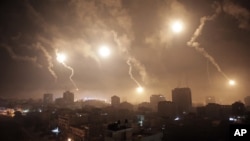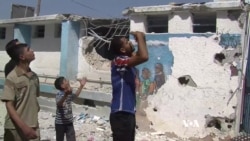By day, except for the high hum of surveillance drones or bursts of bombs and artillery fire, parts of the Gaza Strip seem unnaturally quiet.
Few pedestrians or vehicles move along Gaza City’s once-bustling commercial streets, with residents preferring to hunker down at home – if they have one. Donkeys and camels wander along the Israeli-Gaza buffer zone, stirring when armored tanks roll through.
Routine has been upended here since Israel began its July 8 offensive to halt Hamas militants from firing rockets at it from Gaza. Now the busiest gathering spots are the 85 sites where nearly 200,000 displaced Palestinians have taken refuge.
By evening, anxiety rises throughout Gaza, residents say, noting Israeli airstrikes intensify at night and into the early morning.
A case in point: Just before daybreak Wednesday, Israeli artillery shells pummeled a United Nations-run school compound where as many as 3,000 had sought shelter. At least 19 people were killed and scores were wounded at the Jebaliya refugee camp in northern Gaza.
Story continues below video:
Several hours later, we surveyed the devastation. A wall had caved in on the classroom where most of the victims had bedded down, and blankets littered the floor along with traces of flesh and blood.
Concern over arms supply
Some refugees accused the West of complicity for supplying funding that armed the Israelis. Their comments echoed those of other Gaza Palestinians, who say the weapons being used to destroy their homes and their lives come from the United States, other Western powers and multinationals. On Wednesday, U.S. defense officials said they would resupply Israeli’s military with ammunition, including grenade launchers.
These Palestinians are convinced the outside world – including Arab nations – has done too little to help or intervene. Some say they feel abandoned.
The United States has pledged $47 million in humanitarian aid, including an initial $15 million to the UN Relief and Works Agency for Palestine Refugees in the Near East (UNRWA) in response to its recent urgent appeal. Other groups, such as the International Federation of Red Cross and Red Crescent Societies, are delivering aid.
Gaza’s Palestinians have found little relief during weeks of conflict, and they’ve grown skeptical about prospects of a temporary cease-fire.
On Wednesday, Israel had declared a four-hour humanitarian cease-fire beginning at 3:00 p.m. local time in parts of Gaza – to let Palestinians restock supplies, address medical needs and bury bodies – but explosions and artillery fire sounded less than a half hour after it began.
Israel Defense Forces said 26 rockets were fired at the Jewish state during the four-hour window, with two of them intercepted above the cities of Ashkelon and Netivot. Drones sounded over Gaza City as the clock ran out.
Each side proposes a break in the conflict when it’s convenient. Last weekend, Israel offered a cease-fire during the Sabbath; Hamas offered a cease-fire prior to Eid al-Fitr, the holiday concluding Ramadan, the Muslim month of atonement.
But the rocket fire, the airstrikes and the artillery fire continue. At night, people in Gaza don’t expect sweet dreams.






